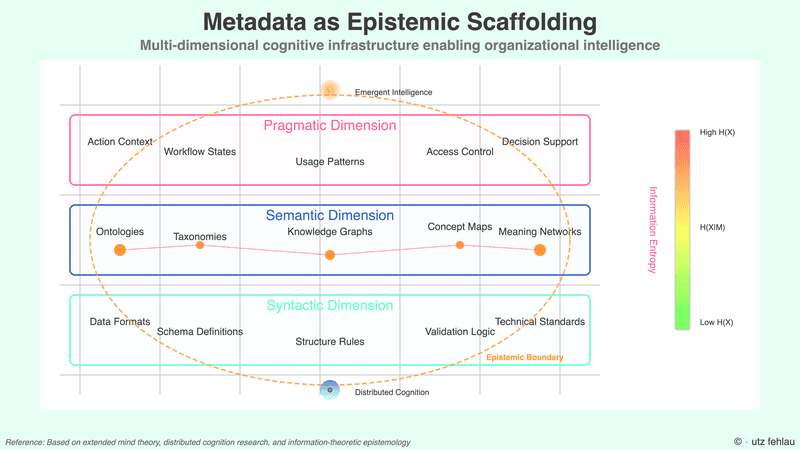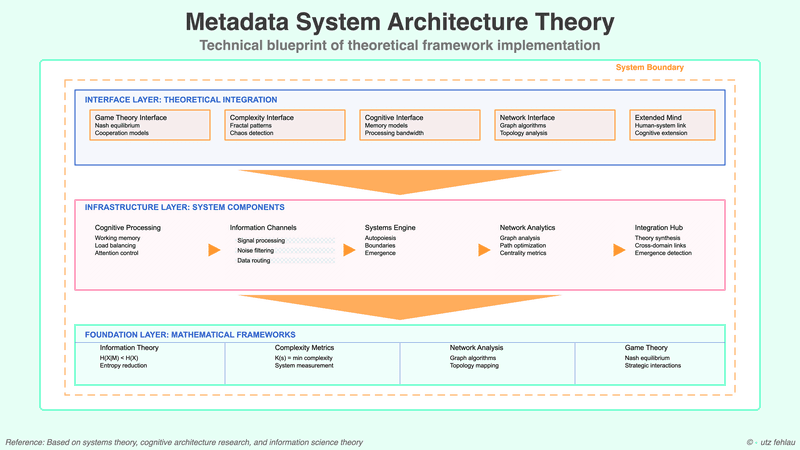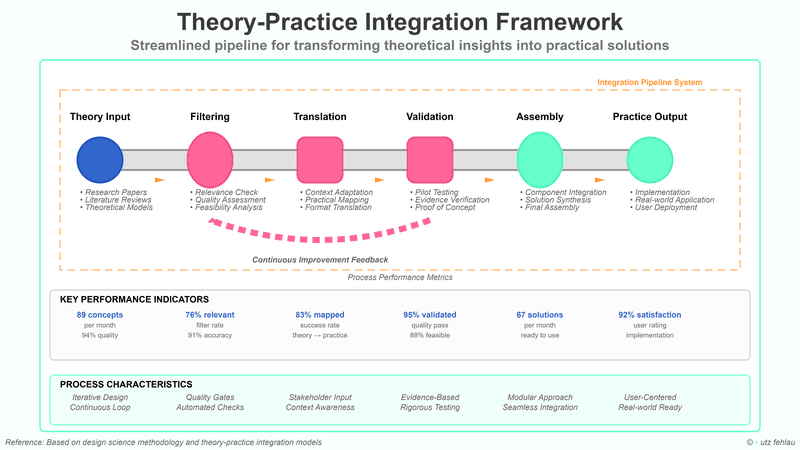Introduction: Metadata as the Epistemic Infrastructure of Organizations
In the landscape of organizational knowledge, metadata represents more than mere technical utility—it embodies a fundamental epistemological principle that governs how knowledge comes to exist, persist, and transform within human systems. While much attention focuses on the practical applications of metadata, the theoretical foundations reveal why metadata is not simply useful but ontologically necessary for knowledge to function as a organizational asset.

Contemporary philosophy of information, pioneered by scholars like Luciano Floridi, positions metadata as constitutive of the information environment itself. This perspective suggests that metadata doesn't merely describe information but partially creates the very possibility of information existing as meaningful content within organizational contexts. When we examine organizational knowledge failures—projects failing due to lost institutional memory, innovations stalled by inaccessible expertise, decisions hampered by unclear data provenance—we observe not just practical inefficiencies but fundamental breakdowns in the metadata infrastructure that enables knowledge to function epistemically.
The theoretical significance extends beyond philosophy into cognitive science, where research on extended mind thesis reveals that metadata functions as cognitive scaffolding that literally extends human intellectual capabilities into organizational memory systems. Studies in distributed cognition demonstrate that metadata doesn't simply organize existing knowledge but creates new possibilities for knowledge combination and synthesis that would be cognitively impossible for individual minds to achieve.
This article examines the theoretical foundations that make metadata not just useful but necessary for organizational knowledge systems. We'll explore how metadata relates to fundamental questions in epistemology, cognitive science, information theory, and systems thinking. Rather than focusing on implementation strategies, we'll investigate the deep structural principles that explain why metadata-rich environments consistently outperform metadata-poor ones in knowledge creation, preservation, and application.
Through this theoretical exploration, you'll understand how metadata functions as the invisible architecture that enables organizational intelligence, why certain metadata structures succeed while others fail, and how theoretical insights can inform more sophisticated approaches to knowledge management design. This understanding provides the conceptual foundation necessary for creating truly intelligent organizational knowledge systems.
Conceptual Foundations: The Philosophy and Mathematics of Metadata

The Ontological Status of Metadata
In classical philosophy, the question "What is metadata?" immediately encounters the fundamental problem of whether metadata represents intrinsic or extrinsic properties of information objects. Traditional library science treated metadata as extrinsic descriptors—labels applied after creation to facilitate organization. However, contemporary information ontology suggests a more complex relationship.
Intrinsic vs. Extrinsic Properties: Consider a document's creation timestamp. Is this metadata about the document or a constitutive property of the document's identity? The timestamp doesn't describe the document's content but establishes its temporal identity in ways that affect its meaning, authority, and relevance. This reveals metadata's dual nature: some elements are clearly extrinsic descriptors, while others participate in defining what the knowledge artifact actually is.
The Boundary Problem: Where does data end and metadata begin? This question reveals that the distinction is contextual rather than absolute. In one system, a project code might be metadata describing a document's organizational context. In another system, that same code might be the primary data element around which other information organizes. This contextual fluidity suggests that metadata isn't an fixed property but a relational characteristic emerging from how information elements function within specific organizational knowledge systems.
Information-Theoretic Perspectives on Metadata
Shannon's information theory provides mathematical frameworks for understanding metadata's role in reducing uncertainty and enabling communication, but its applications to organizational knowledge require extension beyond simple transmission models.
Entropy and Metadata Hierarchies: In information-theoretic terms, metadata reduces the entropy of information searches by constraining the possibility space of relevant content. Consider a document tagged with specific project codes, expertise areas, and process phases. Each metadata element eliminates potential search targets, mathematically reducing the uncertainty that users face when seeking relevant knowledge.
The relationship follows the principle: H(X|M) < H(X), where H(X|M) represents the entropy of finding relevant information X given metadata M, and H(X) represents entropy without metadata constraints. This mathematical relationship explains why comprehensive metadata systems consistently improve search efficiency—they systematically reduce the uncertainty space users must navigate.
Compression and Complexity: Metadata exhibits seemingly paradoxical compression properties. While adding metadata increases total information volume, it typically reduces the cognitive complexity required to navigate that information. This reflects Kolmogorov complexity principles: adding structured metadata often reduces the algorithmic complexity required to extract meaning from information collections.
Cognitive Science and Extended Mind Theory
The extended mind thesis, developed by philosophers Andy Clark and David Chalmers, provides crucial insights into why metadata functions so effectively as cognitive infrastructure in organizations.
Cognitive Scaffolding: Metadata performs what cognitive scientists call "cognitive offloading"—transferring mental processing requirements to external structures. When a researcher relies on metadata tags to remember which documents relate to specific methodological approaches, the metadata system becomes part of their extended cognitive apparatus for managing complex research projects.
This scaffolding relationship explains why users often struggle when metadata systems change unexpectedly. The adaptation isn't simply learning new tools but reconstructing cognitive-environmental couplings that support complex thinking processes.
Distributed Cognition: Organizations exemplify distributed cognitive systems where knowledge resides not in individual minds but in networks of people, tools, and information structures. Metadata serves as the communication protocols that enable different parts of this distributed system to coordinate effectively.
From this perspective, metadata breakdowns represent failures in organizational cognitive systems rather than mere information management problems. Poor metadata creates cognitive bottlenecks that constrain organizational intelligence regardless of individual expertise levels.
Semiotics and the Meaning-Making Function
Pierce's semiotic theory offers frameworks for understanding how metadata participates in organizational meaning-making processes across syntactic, semantic, and pragmatic dimensions.
Syntactic Metadata: Governs structural relationships and formal rules without addressing semantic content. File formats, version numbers, and technical specifications operate primarily at this level. They enable systems to process information objects without understanding their meaning.
Semantic Metadata: Bridges syntax and meaning by providing interpretive frameworks. Subject classifications, keyword tags, and content descriptions operate at this level, enabling systems and users to understand what information objects are about rather than just how they're structured.
Pragmatic Metadata: Connects information to action contexts, indicating how knowledge should be used within specific organizational situations. Access permissions, workflow states, and utilization histories operate pragmatically, informing decisions about how to act on information rather than just what it means.
The interaction between these levels explains why effective metadata systems require multi-dimensional design that addresses technical processing, semantic understanding, and practical application simultaneously.
Theoretical Framework: Deep Structures of Metadata Systems

Systems Theory Perspective on Metadata
Systems thinking reveals metadata as the organizational equivalent of cellular proteins—specialized structures that enable complex information metabolism within organizational systems.
Autopoiesis and Metadata: Borrowing from biologist Humberto Maturana's concept of autopoiesis, organizational knowledge systems maintain themselves through continuous metadata creation and maintenance. Like biological cells that must continuously synthesize the proteins that maintain cellular organization, knowledge systems must continuously generate and update the metadata that enables their own organization.
This perspective explains why metadata decay presents such serious challenges. As metadata becomes outdated or inconsistent, the system's capacity for self-organization degrades, potentially leading to information system "death"—states where accumulated disorder prevents effective knowledge retrieval or application.
Emergence and Metadata Networks: Complex systems theory suggests that sophisticated organizational behaviors emerge from simple rules applied consistently across many interactions. In metadata systems, global organizational intelligence emerges from local metadata practices that enable knowledge connections, discovery, and combination.
The mathematical principle underlying this emergence follows power law distributions: Most organizational knowledge value emerges from a small percentage of highly connected metadata nodes that enable disproportionate knowledge discovery and synthesis.
Game Theory and Metadata Cooperation
Game theory provides insights into why metadata systems often face collective action problems and how organizational design can address these challenges.
The Metadata Commons Problem: Creating high-quality metadata requires individual effort but provides collective benefits. This creates classic free-rider problems where individuals have incentives to benefit from others' metadata efforts without contributing proportionally themselves.
The situation resembles the tragedy of commons, where individual rational behavior (minimizing metadata effort) leads to collectively irrational outcomes (degraded knowledge findability). Understanding this dynamic helps explain why metadata systems require careful incentive design and governance structures.
Coordination Games and Standards: Metadata systems also exhibit coordination game characteristics where all participants benefit from consistent practices, but multiple consistent practices could theoretically exist. The challenge involves coordinating on specific metadata standards rather than avoiding free-riding.
Network effects amplify the value of coordination: As more organizational members adopt consistent metadata practices, the value of that consistency increases exponentially rather than linearly.
Complexity Science and Information Organization
Complexity science offers frameworks for understanding how organizational knowledge systems self-organize and how metadata influences these processes.
Edge of Chaos Dynamics: Complex adaptive systems often operate most effectively at the "edge of chaos"—states balanced between rigid order and complete disorder. Metadata systems exhibit similar dynamics: Too little metadata creates chaotic information environments, while excessive metadata creates rigid structures that inhibit innovation and adaptation.
The optimal metadata density appears to follow principles from complexity science where maximum functional diversity emerges at intermediate levels of structural constraint.
Network Theory Applications: Metadata creates network structures within organizational knowledge, and these networks exhibit properties studied in network science: small-world effects, preferential attachment, clustering coefficients, and centrality measures.
Understanding these network properties enables more sophisticated approaches to metadata design that leverage natural network formation tendencies rather than imposing artificial organizational structures.
Information Architecture Theory
Information architecture theory provides frameworks for understanding how metadata structures support or inhibit different types of organizational knowledge work.
Affordance Theory: Metadata creates what cognitive scientist James J. Gibson called "affordances"—possibilities for action that emerge from the relationship between environmental structures and actor capabilities. Well-designed metadata creates affordances for knowledge discovery, combination, and application that wouldn't exist otherwise.
Different metadata structures create different affordances. Hierarchical subject classifications create browsing affordances, while associative tagging creates serendipitous discovery affordances. Understanding these affordance relationships enables more intentional metadata design.
Cognitive Load Theory: Human cognitive limitations constrain how much metadata complexity users can effectively process. However, these limitations aren't fixed—they depend on expertise, context, and system design choices.
Cognitive load theory suggests that effective metadata systems optimize across three types of load: intrinsic complexity (inherent in the domain), extraneous complexity (created by system design), and germane complexity (required for learning and insight generation).
Theoretical Analysis: Mathematical and Philosophical Implications
Mathematical Models of Metadata Effectiveness
Recent advances in applied mathematics provide quantitative frameworks for modeling metadata system effectiveness and predicting optimal organizational configurations.
Graph Theory Models: Treating organizational knowledge as graphs where documents are nodes and metadata relationships create edges, we can apply graph metrics to predict system performance. Clustering coefficients predict knowledge community formation, while path length distributions predict average knowledge discovery times.
The mathematical relationship follows: E(discovery_time) = f(path_length, clustering, centrality), where path length represents metadata-mediated connections between knowledge seekers and relevant content.
Information Retrieval Mathematics: Precision and recall metrics from information retrieval provide frameworks for measuring metadata system effectiveness quantitatively. However, organizational contexts require extensions that account for serendipitous discovery and knowledge synthesis—outcomes that standard IR metrics fail to capture.
Advanced models incorporate utility functions that weight different types of knowledge discovery based on organizational value creation rather than simple relevance matching.
Epistemological Implications
Metadata systems embody implicit epistemological commitments about the nature of knowledge and how it should be organized, discovered, and validated within organizations.
Foundationalism vs. Coherentism: Traditional hierarchical metadata systems reflect foundationalist epistemologies that assume knowledge builds from basic, certain foundations. Modern networked metadata approaches align more with coherentist epistemologies that view knowledge validity as emerging from coherent relationship networks rather than foundational certainty.
This philosophical difference has practical implications for how organizations structure authority, validate knowledge claims, and adapt to changing understanding.
Knowledge Representation Problems: Metadata systems face fundamental challenges in representing tacit knowledge, contextual understanding, and embodied expertise. These limitations aren't technical problems to be solved but philosophical constraints that reveal the boundaries of what metadata can accomplish.
Understanding these boundaries enables more realistic expectations and complementary approaches that combine metadata systems with other knowledge management strategies.
Phenomenological Perspectives
Phenomenology, the philosophical study of experience, offers insights into how metadata affects knowledge workers' lived experience and the meaning-making processes that create organizational intelligence.
Intentionality and Information Relevance: Phenomenologist Edmund Husserl's concept of intentionality—the mind's directedness toward objects—helps explain why metadata effectiveness depends on anticipating user intentions rather than simply organizing content.
Effective metadata systems create what phenomenologists call "horizons of expectation" that guide knowledge workers toward relevant information while remaining open to unexpected discoveries that redirect their attention productively.
Embodied Cognition: Modern phenomenology emphasizes how thinking is embodied and situated rather than abstract and universal. This perspective suggests that metadata systems must account for the embodied nature of knowledge work—how people's physical and social contexts shape their information needs and interpretation processes.
Applied Theoretical Insights: Case Studies in Metadata Theory
Case Study 1: Johnson & Johnson – Data Science and Metadata in Pharmaceutical Innovation
Theoretical Framework Applied:
Complex systems and information architecture in large-scale healthcare organizations.
Research Context:
Johnson & Johnson (J&J) has invested heavily in data science and metadata-driven approaches to transform drug discovery, diagnostics, and supply chain management. With over 6,000 data scientists and digital specialists, J&J leverages a centralized data infrastructure that integrates clinical trial data, patient records, and real-world evidence, all structured and made accessible through robust metadata practices.
Key Theoretical Findings:
J&J’s metadata-rich environment supports advanced AI algorithms that analyze massive health datasets, enabling earlier disease detection, more precise drug targeting, and optimized production schedules. For example, AI-driven analysis of metadata from the UK Biobank uncovered thousands of previously unknown genetic variants relevant to drug development. In supply chain management, integrating real-time metadata from multiple sources has resulted in faster, more cost-effective delivery of treatments to patients.
Implications for Theory:
This case demonstrates how metadata is foundational to organizational intelligence and innovation in complex, data-intensive environments, supporting the claim that metadata-rich systems are essential for knowledge creation and application in healthcare.
Source:
- J&J Enlists Thousands of Data Scientists in Health Bet – MOSIMTEC
- 5 award-winning innovations from J&J’s data science showcase
Case Study 2: Metadata in Knowledge Management – Motorsport Engineering and Pharmaceutical Sectors
Theoretical Framework Applied:
Distributed cognition and semantic metadata frameworks in organizational knowledge management.
Research Context:
A doctoral thesis by Dimitris Apostolou at Loughborough University presents empirical case studies from two knowledge-intensive companies—a motorsport engineering firm and a pharmaceutical company—exploring how metadata is used in their Knowledge Management Systems (KMS). The research involved field visits, interviews, and document analysis to assess user satisfaction, metadata creation practices, and the semantic mapping of organizational metadata schemes to the Dublin Core standard.
Key Theoretical Findings:
The study found that effective metadata design and user engagement are critical for successful knowledge management. User willingness to create metadata correlated with factors such as qualification and experience, and mapping internal metadata to open standards improved interoperability and knowledge discovery. The research produced a checklist framework for developing comprehensive metadata schemes in organizational contexts.
Implications for Theory:
The findings validate the distributed cognition perspective, showing that metadata acts as cognitive scaffolding for both individuals and organizations, and that thoughtful metadata frameworks are essential for knowledge sharing and reuse.
Source:
- Apostolou, D. (2009). The role of metadata in managing knowledge. Loughborough University. Download PDF
Case Study 3: Airbnb’s Data University – Democratizing Metadata and Data Literacy
Theoretical Framework Applied:
Pragmatic metadata, organizational learning, and data democratization.
Research Context:
Airbnb launched “Data University” to provide data and metadata education to all employees, not just technical staff. The program included foundational to advanced courses on data literacy, analytics tools, and the use of Airbnb’s internal metadata-rich data platforms. The initiative aimed to empower employees to make data-informed decisions and foster a culture of data-driven innovation.
Key Theoretical Findings:
The program significantly increased the adoption of data platforms (from 30% to 45% weekly active usage), reduced ad hoc data requests to the data science team, and improved overall data literacy across the organization. The curriculum’s success led to the introduction of “Data U Intensive,” a tailored, immersive training for specific teams, further enhancing engagement and applicability.
Implications for Theory:
This case exemplifies how pragmatic metadata education and organizational affordances for knowledge discovery enable scalable, sustainable data-driven decision-making, supporting the extended mind and distributed cognition theories.
Source:
- Harris, H., & Mehrotra, R. (2018). How Airbnb Democratizes Data Science With Data University. Airbnb Engineering Blog
- Airbnb’s Data University: Shifting to a Data-Centric Organization Through Employee Training (The Case Centre, 2024)
Strategic Integration: Theoretical Principles for Practice

Bridging Theory and Implementation
The gap between metadata theory and organizational practice often results from insufficient translation of theoretical insights into actionable design principles. However, several emerging frameworks successfully bridge this divide.
Design Science Approach: Design science methodology provides frameworks for incorporating theoretical knowledge into practical artifact creation. For metadata systems, this involves iterative cycles where theoretical insights inform design decisions, implementations generate empirical data, and results refine both theory and practice.
This approach has proven particularly effective for addressing complex trade-offs between theoretical ideals (like complete knowledge representation) and practical constraints (like cognitive load limitations and organizational change capacity).
Theory-Informed Heuristics: Rather than applying theories directly, successful organizations develop theory-informed heuristics that guide metadata system decisions. These heuristics encode theoretical insights in forms that practitioners can apply without requiring deep theoretical expertise.
For example, complexity science insights about edge-of-chaos dynamics translate into heuristics about maintaining balance between metadata standardization and flexibility for innovation.
Developing Theoretical Sophistication
Organizations benefit from developing what we might call "theoretical sophistication" in their approach to metadata—deep understanding of underlying principles that enables more intelligent responses to novel situations.
Metalevel Thinking: Theoretical sophistication involves thinking at multiple levels simultaneously: operational (how to tag this document), tactical (how to design this metadata schema), strategic (how metadata supports organizational knowledge goals), and philosophical (what assumptions about knowledge underlie our metadata choices).
This metalevel awareness enables organizations to adapt metadata systems more intelligently as contexts change rather than simply following best practices developed in different contexts.
Theory-Practice Feedback Loops: Sophisticated organizations create systematic feedback loops where practical experience informs theoretical understanding, which then guides improved practice. This requires deliberately experimenting with theory-informed innovations and carefully studying their outcomes.
Future Directions in Metadata Theory
Several emerging areas promise to expand our theoretical understanding of metadata in organizational contexts.
Quantum Information Perspectives: Recent work applying quantum information theory to semantic relationships suggests new ways of understanding how metadata systems might represent and process organizational knowledge. While highly speculative, these approaches offer potential frameworks for addressing current limitations in representing ambiguous, contextual, and evolving knowledge.
Artificial Intelligence and Metadata: As AI systems become more sophisticated, new theoretical questions emerge about the relationship between human-created metadata and machine-learned representations. Understanding these relationships requires extending current theories to account for hybrid human-AI knowledge systems.
Complexity-Informed Design: Advances in complexity science continue to reveal new principles relevant to metadata system design. Current research explores how metadata systems might self-organize more effectively and how to design interventions that leverage rather than fight against natural organizational dynamics.
Conclusion: The Theoretical Imperative for Organizational Intelligence
The theoretical foundations of metadata reveal why these systems represent more than convenient organizational tools—they constitute infrastructure for organizational intelligence itself. Through our exploration of philosophical, mathematical, and cognitive perspectives, several fundamental insights emerge that challenge common assumptions about metadata's role in organizational knowledge systems.
Metadata as Constitutive of Knowledge: Rather than simply describing pre-existing knowledge, metadata partially constitutes what counts as knowledge within organizational contexts. This ontological insight explains why metadata design decisions have such profound effects on organizational intelligence and innovation capacity.
The Theoretical-Practical Synthesis: Successful metadata systems require integration of theoretical sophistication with practical implementation skills. Organizations that develop deep theoretical understanding of how metadata functions create more adaptive, resilient, and innovative knowledge systems than those that focus solely on technical implementation.
Emergent Intelligence: The mathematical and systems-theoretic perspectives demonstrate that organizational intelligence emerges from the interaction of many local metadata practices rather than being designed from the top down. This emergence principle suggests that metadata system design should focus on creating conditions for productive emergence rather than attempting to control all aspects directly.
Philosophical Implications: The theoretical analysis reveals that metadata choices embody implicit philosophical commitments about the nature of knowledge, truth, and organizational reality. Making these commitments explicit enables more intentional and effective metadata design aligned with organizational values and objectives.
The Future of Organizational Knowledge: As organizations become increasingly complex and knowledge-intensive, theoretical sophistication in metadata design will become a crucial source of competitive advantage. Organizations that understand metadata's theoretical foundations will create knowledge systems that not only manage information more effectively but enable entirely new forms of organizational intelligence and innovation.
The theoretical imperative is clear: metadata systems represent too important a foundation for organizational intelligence to be designed without deep theoretical understanding. The organizations that invest in developing this understanding—combining philosophical insight, mathematical precision, and cognitive science knowledge—will create the knowledge systems that define the future of organizational intelligence.
Moving forward, the integration of theoretical sophistication with practical implementation represents the next frontier in organizational knowledge management. The question isn't whether your organization needs metadata, but whether you're designing those systems with sufficient theoretical understanding to realize their full potential for creating organizational intelligence.
#KnowledgeManagement #InformationScience #SystemsThinking #CognitiveScience #ComplexSystems #InformationTheory #Epistemology #OrganizationalIntelligence
References
Floridi, L. (2013). The Ethics of Information. Oxford University Press. ISBN: 978-0199641321
Hutchins, E. (1995). Cognition in the Wild. MIT Press. ISBN: 978-0262581462
Barabási, A.-L. (2016). Network Science. Cambridge University Press.
Newman, M. (2018). Networks: An Introduction (2nd ed.). Oxford University Press
Dreyfus, H. L. (2002). Intelligence Without Representation – Merleau-Ponty's Critique of Mental Representation. Phenomenology and the Cognitive Sciences, 1(4), 367–383.
Clark, A., & Chalmers, D. (1998). The Extended Mind. Analysis, 58(1), 7-19. DOI: 10.1093/analys/58.1.7
Shannon, C. E. (1948). A Mathematical Theory of Communication. Bell System Technical Journal, 27(3), 379-423. DOI: 10.1002/j.1538-7305.1948.tb01338.x
Maturana, H. R., & Varela, F. J. (1980/2009). Autopoiesis and Cognition: The Realization of the Living. Springer. ISBN: 978-9048132607
